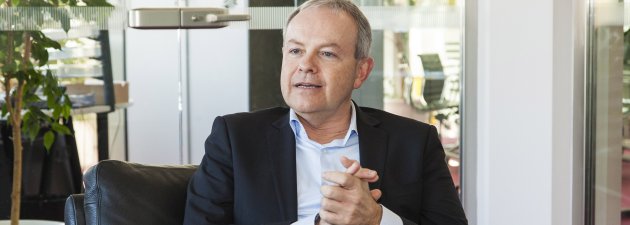Executive board member at the German-Czech Chamber of Industry and Commerce (DTIHK) and delegate of the Free State of Bavaria in the Czech Republic in one person - that is Bernard Bauer. In this interview for TRADE NEWS, he talks about the successful cooperation between the Czech Republic and Bavaria, and at the same time explains how it can be expanded and taken to a higher level.
The Czech Republic is an important trade partner of the Free State of Bavaria. How does it rank compared to other countries in this respect? What are the specifics of Czech-Bavarian economic cooperation?
For three decades, the Czech Republic has been one of Bavaria's most important foreign trade partners, and vice versa. That’s why we set up a Bavarian economic delegation within DTIHK more than fifteen years ago. Year after year, Czech suppliers rank at the top of the quality rankings in automotive, engineering or electronics but also in high-tech industries.
With a trade volume of around 24 billion euros, the Czech Republic ranked second after Austria last year in terms of Bavaria's foreign trade with the countries of Central, Eastern and Southern Europe. The specifics of our cooperation are determined by our geographical and cultural proximity, a very strong automotive tradition and investment in innovation. Bavarian and Czech companies also benefit from the know-how of researchers and engineers from both countries.
Many things simply fit together well
What do Bavarian businessmen value the most in their Czech partners and what are some of the barriers to a more intensive cooperation?
Our close proximity is key, as it has enormous advantages in terms of logistics alone. Cultural ties and traditions play an equally important role. Entrepreneurs on both sides feel the same way about the quality and maintenance of their products. Many things simply fit together well.
Some improvement is needed in vocational training. This has been pointed out for two decades by many German investors in our annual business survey. The Czech Republic must act now. If you want to stay competitive, you need to quickly introduce flexible vocational training that is closely linked with practice and the rapid technological development in companies. This is increasingly important with the rise of digitization and the transition to e-mobility.
If Czechia wants to stay competitive, you need to quickly introduce flexible vocational training that is closely linked with practice and the rapid technological development in companies.
Connecting businesses via R&D is crucial
Over the last ten years, Bavaria has become the go-to place for cross-industry innovation. Can you give some examples of partnerships between Czech and Bavarian companies when it comes to innovation and fostering entrepreneurship?
You are right, cooperation of businesses across industries and connecting them via R&D are the main prerequisites for an economy to stay competitive. Clusters are very important in this respect. One of the flagships of innovative Bavarian-Czech cooperation is the EU project of 5G Corridor Munich‒Prague, which was launched in 2020 on the initiative of both governments and is already in the technical implementation phase.
Thanks to the speed and stability of data transmission, 5G networks can connect thousands of devices simultaneously, creating space for the development of other innovative services. For example, factories can use automated processes as well as connected machinery and equipment, thus increasing work safety and productivity. Supply chains can be optimized, vehicles will be able to communicate with one another, and medical care can be provided remotely to patients in distant areas. The use of AI, for instance, can thus move to another level. It is a great example of bilateral cooperation between business, academia and the public sector, which is of European importance. And we could name others, such as the BMW test polygon for autonomous driving near Sokolov for example.
For many years, Czech exports to Germany were mostly in the manufacturing sector. Following the covid pandemic, Czech companies have become more interested in opening their own branches in Germany and strengthening their investment in innovation and technologies. How do you see this trend evolve moving forward?
That's right, we've been seeing for a long time that Czech companies, particularly those in the tech sectors, are exploring the German market with confidence, using it as a gateway to the global expansion of their business. This trend continues, and it’s not just companies like Creative Dock or Knuspr.de (Czech company Rohlik.cz), but also many B2B companies that are looking for partners in Germany or investing in the German market, for example in energy or banking. There are also Czech start-ups here, particularly in the IT sector. One of them is Ackee, whose developers have designed a mobile app for the German Bundestag, thus helping to fight against fake news. Among the larger companies, I would like to name the innovative company Adastra, which has a branch in Germany to be closer to its clients.
Czech Republic is no longer just an assembly plant
There has long been a frequent debate in our country about the overly strong ties of the Czech economy to its German partner, particularly in automotive. Some say that the Czech Republic is an "assembly plant" and we should abandon this model and shift our focus elsewhere. What do you think about it?
Both countries have a high level of automotive know-how. Anyone who might dismiss this centuries-old tradition overboard as "mere manufacturing" with little added value would be greatly mistaken. By the way, German manufacturing competence is one of the main reasons why big tech giants invest in our country. As for Czechia, German investors have set up many R&D centres here in the last few years. Some of these centres design products for the global market. "Assembly plants" that get mentioned so often are almost non-existent in your country nowadays.
Both countries have a high level of automotive know-how. "Assembly plants" are almost non-existent in your country nowadays.
And maybe one more note on the somewhat critical view of Czech-German cooperation. There have been some political omissions on the Czech side as well. Support of transformation to e-mobility has long been neglected and only recently has it come into the centre of government attention. Those who want to define standards must take on these trends proactively, with a leadership spirit. Czechia has managed to do this really well in the highly developed areas of nanotechnology or ICT, where there is also great potential.
Germany is a country of large industrial enterprises, but at the same time, 42% of its GDP and 55% of workforce is provided by the Mittelstand – i.e. SMEs, often family-owned companies. They typically specialize in niche, top-quality production and, thanks to their ownership structure, are more resistant to market turbulences than many larger businesses. How are they adapting to the increasingly competitive environment these days?
In these turbulent times of external shocks and transformation, there are of course takeovers and insolvencies in the SME sector as well – this is something you can never avoid completely. However, it is true that the much-praised German Mittelstand is still characterized by a high degree of resilience, flexibility and greater independence; it is still the backbone of our economy. But there is no doubt that the challenges posed by the global shifts and protectionism are enormous. Therefore, the state must first ensure that energy becomes cheaper, as that will make life easier for businesses.
The state must first ensure that energy becomes cheaper, as that will make life easier for businesses.
Cross-border and space cooperation
In a recent meeting between the Czech and Bavarian Prime Ministers, a memorandum on strengthening cooperation in the field of aviation and space was signed, among other things. What specific projects or steps should be involved in this cooperation?
It is still too early to talk about specific projects. However, the joint declaration of intent by the two heads of government from May 2023 is an important signal for the future expansion of our cooperation in these fields. The Czech Republic and Bavaria are important industrial locations for airlines. Prague is also the seat of the European Union Agency for the Space Programme (EUSPA), which implements the EU's space programmes. Universities, research institutions and businesses on both sides can benefit greatly from this close cooperation. As Prime Minister Petr Fiala already mentioned, it is not only about satellite technology and communication, but also about launch vehicles and technology applications, such as satellite image processing and the use of satellite navigation.
INTERREG Bavaria-Czechia is the very first programme that has supported cross-border cooperation approved by the European Commission and active for almost 30 years. How do you evaluate its progress and impact so far? The areas of Culture and Sustainable Tourism and Education have the highest priority now. Can you give examples of concrete projects that fall into these areas?
Although INTERREG Bavaria‒Czech Republic has been operating for over twenty years, the first economic topic was included as late as in the 2014 to 2020 period. The implementation of the cross-border cooperation programme Czech Republic - Free State of Bavaria ETC goal 2014 – 2020 went according to plan.
A total of €97 million in funding was available for projects in research, technological development and innovation, environmental protection and resource efficiency or skills and education, and they were also implemented successfull. Immediately afterwards, the funding period of INTERREG Bavaria‒Czech Republic (2021–2027) began with funding of €99 million. As DTIHK, we have applied for the INTERREG Bavaria‒Czech Republic project, within which SMEs can learn about the possibilities of climate-neutral and sustainable production through so-called innovation labs. For INTERREG Saxony‒Czech Republic, we want to create a digital Saxon-Czech supplier platform to avoid supply chain issues and retain jobs at the same time.
Bernard Bauer was interviewed by Daniel Libertin
Photo credits: Dean Batak







